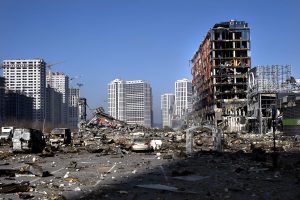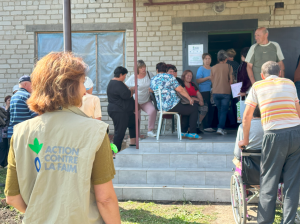

Your browser is not up to date.
If you wish to view the Action Against Hunger website correctly, update your browser.
Find the latest versions of supported browsers listed below.
No matching results…
No results seem to match what you are looking for, please modify your search.
 © Arthur De Poortere pour Action contre la Faim
© Arthur De Poortere pour Action contre la Faim
Headline
“The fighting was getting closer to our house and the strikes were multiplying. We ran out of food and the children were hungry. The situation was critical“, recalls Nadezhda, a resident of Mariupol who fled the siege of the town with her husband and their two children.
The family, already displaced in 2018 from the Donetsk region, settled in Zaporijia, a town in eastern Ukraine, also under constant threat of bombardment.
The dates when her fate and that of her family were sealed come back to her mind with precision: “On 17 March, we boiled the last packet of pasta, because there was really nothing else. Then, miraculously, on the morning of the 18th, we managed to leave. We took a rucksack with documents and a small bag with baby things. We only took what we could carry“, she laments.
What remains of Mariupol, an industrial town on the shores of the Sea of Azov, is a devastated landscape. Nadezhda, like the 350,000 residents who managed to leave the town, will always be marked by the violence she experienced. Her story echoes those of millions of men, women and children forced to leave their homes to seek shelter in other towns in Ukraine or abroad. For most of them, the level of destruction in their homes is such that returning is unthinkable.


As the conflict in Ukraine enters its third year, the war continues to worsen the living conditions of civilians and to hamper their access to health, education and other basic services, particularly in the south and east of the country. Some people, like Valentyna, a resident of Ivanivka, a village in the Kharkiv region, have had to abandon their farming activities because the land is mined. Others, like Yuri from Mariupol, are struggling to find work to support themselves in the current economic crisis. After two years of war, humanitarian organisations have collected a plethora of stories of shattered lives.
Since March 2022, the Ukrainian population has faced increased levels of poverty and dependence on aid. 65% of Ukrainian households have seen their incomes fall, and almost 44% of them are struggling to meet their basic needs, despite receiving government aid of up to 3,000 hryvnias (around €73). In all, 40% of the Ukrainian population is said to be in need of humanitarian assistance.
Displacement, the loss of loved ones and the lack of means of subsistence are taking their toll on the mental health of the population, particularly the most vulnerable. A quarter of the Ukrainian population is said to be suffering from various forms of mental disorder as a result of the conflict, a trend that is increasing as the conflict drags on.
A large proportion of Ukrainian children have been deprived of formal education for the past 4 years as a result of the COVID-19 pandemic and the war, affecting their cognitive development and damaging their mental health. In addition, women whose husbands have joined the army are left alone to look after the members of their household, and they are not always able to generate sufficient resources to meet everyone’s needs. The provision of psychological and psychosocial assistance, particularly for children, adolescents and care givers, remains a programme priority for Action contre la Faim (ACF).
For some people, humanitarian aid has been the key to overcoming the difficulties associated with war. By receiving psychological support, Natalia overcame the loss of her father and the traumas associated with the conflict. Maksim feels that he has grown up and regained his self-confidence thanks to the psychological and psychosocial support sessions for teenagers at a collective accommodation centre in Dnipro. Nadiya and her husband, who are unemployed following the closure of their village school, have benefited from financial support that has enabled them to make ends meet.


In 2023, in response to the destruction of infrastructure essential to people’s survival, Action contre la Faim strengthened its collaboration with Ukrainian organisations that share its values and principles of intervention.
Following the destruction of the Nova Kakhovka dam, we provided hot meals to people affected by the floods, in partnership with the World to Ukrainian association, in the Mykolaiv region. Upstream of the dam, in Pokrov, we distributed 95,500 bottles of water, or 573,000 litres, to the 52,000 inhabitants of the community, in coordination with humanitarian partners and the local water management authorities (Vodokanals). In addition, the supply of sodium hypochlorite and activated carbon has supported the reactivation of the Pokrov drinking water treatment plant.
Although the water and sanitation infrastructure was already ageing before 24 February 2022, war damage has accelerated its deterioration. In order to guarantee access to drinking water for the population, in conjunction with the Vodokanals, Action contre la Faim is financing the purchase of equipment and products used in water treatment.
In total, since March 2022, Action contre la Faim has provided humanitarian aid to 960 000 people across Ukraine. Our operations aim to increase food security, particularly for displaced and vulnerable people, facilitate access to primary healthcare and psychological support, and guarantee access to water, hygiene and sanitation.
The front line has remained stable since the Ukrainian counter-offensive of June 2023, and military mobilisation continues. In 2024, the humanitarian situation could deteriorate further and many Ukrainians could once again be forced to leave everything to save their lives.


Moreover, the wave of solidarity that followed 24 February 2022 is showing signs of weakening as the conflict drags on and other crises change the direction of international aid. In December 2023, the United Nations estimated that 3.9 billion dollars were required for the deployment of appropriate humanitarian aid, but around 60% of the appeal had been funded.
The war is not over – needs continue to grow and public services cannot cope on their own. Taking into account the scale of the needs and maintaining funding over the long term is therefore essential if humanitarian organisations are to continue to provide effective aid over the long term.
Ukraine
All the news of our Action: articles, events, testimonials, press releases…